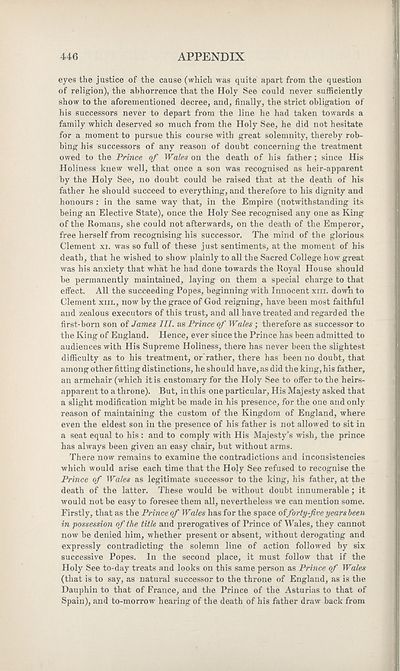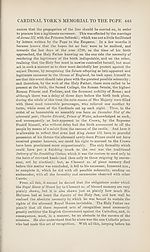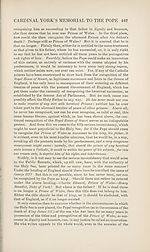Series 2 > Origins of the 'Forty-five
(543) Page 446
Download files
Complete book:
Individual page:
Thumbnail gallery: Grid view | List view

446
APPENDIX
eyes the justice of the cause (which was quite apart from the question
of religion), the abhorrence that the Holy See could never sufficiently
show to the aforementioned decree, and, finally, the strict obligation of
his successors never to depart from the line he had taken towards a
family which deserved so much from the Holy See, he did not hesitate
for a moment to pursue this course with great solemnity, thereby rob¬
bing his successors of any reason of doubt concerning the treatment
owed to the Prince of Wales on the death of his father; since His
Holiness knew well, that once a son was recognised as heir-apparent
by the Holy See, no doubt could be raised that at the death of his
father he should succeed to everything, and therefore to his dignity and
honours : in the same way that, in the Empire (notwithstanding its
being an Elective State), once the Holy See recognised any one as King
of the Romans, she could not afterwards, on the death of the Emperor,
free herself from recognising his successor. The mind of the glorious
Clement xi. was so full of these just sentiments, at the moment of his
death, that he wished to show plainly to all the Sacred College how great
was his anxiety that what he had done towards the Royal House should
be permanently maintained, laying on them a special charge to that
effect. All the succeeding Popes, beginning with Innocent xm. down to
Clement xin., now by the grace of God reigning, have been most faithful
and zealous executors of this trust, and all have treated and regarded the
first-born son of James III. as Prince of Wales; therefore as successor to
the King of England. Hence, ever since the Prince has been admitted to
audiences with His Supreme Holiness, there has never been the slightest
difficulty as to his treatment, or rather, there has been no doubt, that
among other fitting distinctions, he should have, as did the king, his father,
an armchair (which it is customary for the Holy See to offer to the heirs-
apparent to a throne). But, in this one particular, His Majesty asked that
a slight modification might be made in his presence, for the one and only
reason of maintaining the custom of the Kingdom of England, where
even the eldest son in the presence of his father is not allowed to sit in
a seat equal to his : and to comply with His Majesty’s wish, the prince
has always been given an easy chair, but without arms.
There now remains to examine the contradictions and inconsistencies
which would arise each time that the Holy See refused to recognise the
Prince of Wales as legitimate successor to the king, his father, at the
death of the latter. These would be without doubt innumerable; it
would not be easy to foresee them all, nevertheless we can mention some.
Firstly, that as the Prince of Wales has for the space olforty-five years been
in possession of the title and prerogatives of Prince of Wales, they cannot
now be denied him, whether present or absent, without derogating and
expressly contradicting the solemn line of action followed by six
successive Popes. In the second place, it must follow that if the
Holy See to-day treats and looks on this same person as Prince of Wales
(that is to say, as natural successor to the throne of England, as is the
Dauphin to that of France, and the Prince of the Asturias to that of
Spain), and to-morrow hearing of the death of his father draw back from
APPENDIX
eyes the justice of the cause (which was quite apart from the question
of religion), the abhorrence that the Holy See could never sufficiently
show to the aforementioned decree, and, finally, the strict obligation of
his successors never to depart from the line he had taken towards a
family which deserved so much from the Holy See, he did not hesitate
for a moment to pursue this course with great solemnity, thereby rob¬
bing his successors of any reason of doubt concerning the treatment
owed to the Prince of Wales on the death of his father; since His
Holiness knew well, that once a son was recognised as heir-apparent
by the Holy See, no doubt could be raised that at the death of his
father he should succeed to everything, and therefore to his dignity and
honours : in the same way that, in the Empire (notwithstanding its
being an Elective State), once the Holy See recognised any one as King
of the Romans, she could not afterwards, on the death of the Emperor,
free herself from recognising his successor. The mind of the glorious
Clement xi. was so full of these just sentiments, at the moment of his
death, that he wished to show plainly to all the Sacred College how great
was his anxiety that what he had done towards the Royal House should
be permanently maintained, laying on them a special charge to that
effect. All the succeeding Popes, beginning with Innocent xm. down to
Clement xin., now by the grace of God reigning, have been most faithful
and zealous executors of this trust, and all have treated and regarded the
first-born son of James III. as Prince of Wales; therefore as successor to
the King of England. Hence, ever since the Prince has been admitted to
audiences with His Supreme Holiness, there has never been the slightest
difficulty as to his treatment, or rather, there has been no doubt, that
among other fitting distinctions, he should have, as did the king, his father,
an armchair (which it is customary for the Holy See to offer to the heirs-
apparent to a throne). But, in this one particular, His Majesty asked that
a slight modification might be made in his presence, for the one and only
reason of maintaining the custom of the Kingdom of England, where
even the eldest son in the presence of his father is not allowed to sit in
a seat equal to his : and to comply with His Majesty’s wish, the prince
has always been given an easy chair, but without arms.
There now remains to examine the contradictions and inconsistencies
which would arise each time that the Holy See refused to recognise the
Prince of Wales as legitimate successor to the king, his father, at the
death of the latter. These would be without doubt innumerable; it
would not be easy to foresee them all, nevertheless we can mention some.
Firstly, that as the Prince of Wales has for the space olforty-five years been
in possession of the title and prerogatives of Prince of Wales, they cannot
now be denied him, whether present or absent, without derogating and
expressly contradicting the solemn line of action followed by six
successive Popes. In the second place, it must follow that if the
Holy See to-day treats and looks on this same person as Prince of Wales
(that is to say, as natural successor to the throne of England, as is the
Dauphin to that of France, and the Prince of the Asturias to that of
Spain), and to-morrow hearing of the death of his father draw back from
Set display mode to:
![]() Universal Viewer |
Universal Viewer | ![]() Mirador |
Large image | Transcription
Mirador |
Large image | Transcription
Images and transcriptions on this page, including medium image downloads, may be used under the Creative Commons Attribution 4.0 International Licence unless otherwise stated. ![]()
| Scottish History Society volumes > Series 2 > Origins of the 'Forty-five > (543) Page 446 |
|---|
| Permanent URL | https://digital.nls.uk/126865707 |
|---|
| Attribution and copyright: |
|
|---|
| Description | Over 180 volumes, published by the Scottish History Society, containing original sources on Scotland's history and people. With a wide range of subjects, the books collectively cover all periods from the 12th to 20th centuries, and reflect changing trends in Scottish history. Sources are accompanied by scholarly interpretation, references and bibliographies. Volumes are usually published annually, and more digitised volumes will be added as they become available. |
|---|


